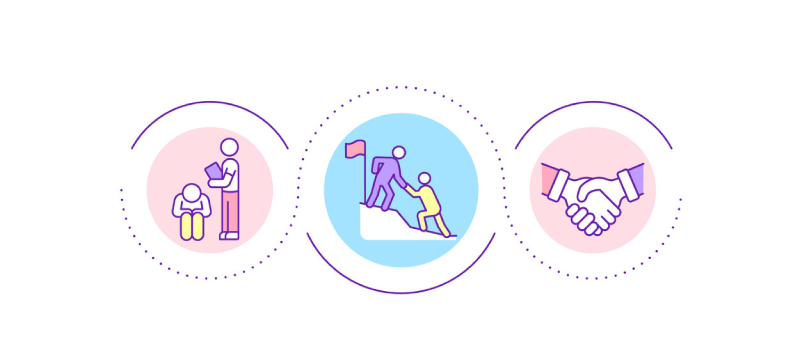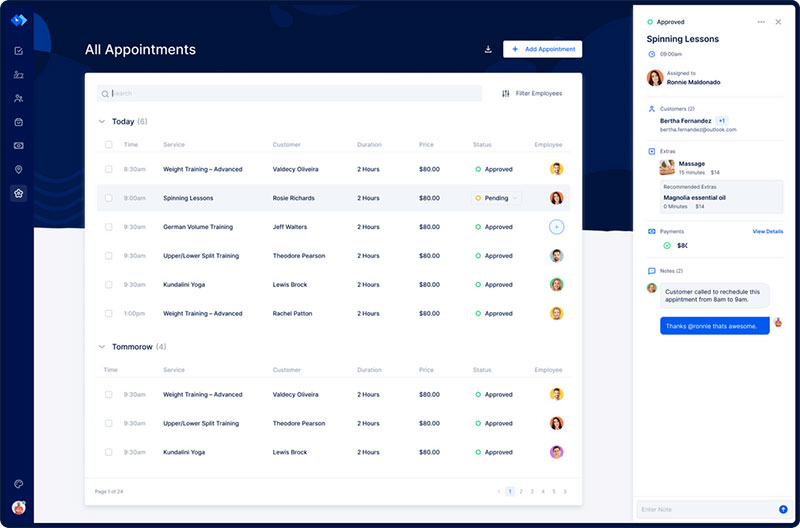In education, science, and politics questions play an important role. Asking questions is the best way of learning and self-evaluation. Anyone who loves learning and excelling should make good use of this method.
Good questions help both the learner and the instructor to go into unexplored territory. Discovering new ideas makes learning exciting. Without questions, there would be no creativity, curiosity, progress, or development.
Questions are an important element of mentoring programs. To make the mentoring experience most effective, you need to evaluate and survey it. How can your organization benefit most from a workplace mentoring program? How can you make sure that it meets the needs of all involved?
You can try and guess the answers to those questions. But actual responses to mentoring program survey questions would be much more helpful. A survey like that will give you more reliable information about critical elements of your mentorship program.
This article will show why it is so important to ask mentoring program survey questions. If you focus on gaining insight and information, you will learn much about the mentoring experience in your organization.
Polling Mentees
A mentorship program survey is a list of questions that helps you to evaluate different elements of your mentoring program.
The way survey participants respond will show where there are opportunities to grow. The survey will show program managers where participants need more challenge or assistance. Survey responses can make your program more effective.
A major benefit of surveying employees is that it empowers them to speak up and share their stories. This will help your mentorship program in many ways.
Refine Your Mentorship Program
Using mentorship program survey questions will give you both positive and negative feedback.
Feedback from program participants allows you to refine the mentoring process. And it can make your organization run more smoothly.
Analyze Your Program
Another good reason for asking for feedback from your mentors and mentees is that it helps you to analyze the program. Mentoring programs at the workplace should always have goals and objectives.
Measuring workplace mentoring program key performance indicators helps you to assess your program. But asking program participants for their experience will help you to see if they find it useful. Positive comments will validate the results that you extract from your key performance indicator analysis.
Resolve Ineffective Mentor-Mentee Matches

Receiving answers to your questionnaire can help you to fix mentor-mentee mismatches quickly. Then, it will help you find a better match and make the best of everybody’s time.
Drafting Survey Questions
Asking good questions is a soft skill. Coming up with questions can sometimes become overwhelming or intimidating if not done right.
Most mentors love curious and inquisitive students. But mentees also need to understand the situation of their mentors: they have many responsibilities and are sometimes under a lot of pressure and stress.
Questioning only for the sake of asking questions is neither productive nor pleasant. Some good and productive questions are:
- Questions that fall under the mentor’s knowledge and field of expertise.
- Clear and well-defined questions. Vague questions like “How do I become a better project manager?” do not work. A better question would be: “How do you avoid stressing over taking on multiple projects?” This is more specific about how to overcome a certain problem related to project management.
- Questions that relate to professional development. Do not force a conversation about this topic and avoid keeping it in general terms.
- Questions that impact you in a positive way. A mentorship session is not the time to be firing question after question. Build up a mentor-mentee relationship. Use questions on topics that your mentor enjoys talking about.
- Polite, intelligent, and thoughtful questions. Again, you are trying to build a relationship of trust.
Your mentorship success story starts with a scheduling app to streamline your calendar
Staying organized has never been easier.
You can now manage your business and grow your brand with a single, powerful software that keeps all of your appointments in line, your clients organized and your business booming.
Trafft is perfect for business owners who need to streamline their booking experience both for their staff and their clients.
Trafft handles everything for you, even sending automated email or SMS reminders to your clients. No-shows? Not anymore!
The Trafft booking software adapts to different industries for a blissful online booking experience and employee management.
Want to know more? Check out Trafft's awesome features to see what you are missing.
Examples of Mentorship Program Survey Questions
The answers you receive depend in large part on the kind of questions you ask. A yes-or-no question will only give you that much information. Open-ended questions, on the other hand, invite program participants to give a more detailed and personal answer.
Try to ask different kinds of questions. One approach will seldom work in every situation. Use open questions as well as multiple-choice questions.
It is clear that a question like “What has your mentor taught you?” has a wide range of answers. A multiple-choice question with limited options will not give you detailed information. Balance and being selective will help you get the most out of the questionnaire.
To inspire you, here are some effective questions that you can use throughout every stage of your mentoring program.
Questions to Ask Before Starting a Mentoring Process
When you get someone involved in a mentoring program, you want to ask more than the usual intake questions. This is a great opportunity to get to know the participants, and they can get to know you. Knowing what kind of people take part helps you to match mentors and mentees.
- Why do you want to take part in the mentoring program?
- Have participated in similar programs in the past? What were your experiences?
- What are you hoping to get out of this program?
- Are you interested in expanding your skill set, here or elsewhere? If yes, what would you like to add to your current expertise?
- What are your past achievements and accomplishments? What can you share with others as a mentor?
- What is most important in your career?
- What innovative ideas do you have or have you had in the past? What issues did they address?
- In what areas would you like to get more support? In what areas do you feel comfortable?
- Do you feel comfortable with your current work/personal life balance?
- Do you have a career action plan? Would you like to change or add to it?
- Questions you can ask mentors/mentees shortly into their mentorship program could be:
- How can we make this mentoring program better for you?
- Were you happy with the mentor-mentee match?
- Where can we improve the matching process?
- What is your opinion about the quality level of the mentors in the program?
- What is your opinion about the number of available mentors?
- After going through the mentor matching process, do you feel positive about the rest of the mentoring program?
Survey Questions for After a Mentoring Session
Take some time after each mentoring session. Consider asking questions such as:
- How is your mentor-mentee relationship with your mentor?
- Rate this session on a scale from one to ten.
- What did you discuss today?
- Did you take notes? What was the key piece of information that you took away?
Survey Questions to Ask Halfway Through a Program
The midway point is a good moment for evaluation. This is the time for mentors, mentees, and program managers to reflect back on the experience. And it is the moment to think about the future, the rest of the program. Some useful questions might be:
- How has your relationship with your mentor/mentee changed during the program?
- What has the primary role of your mentor been for you?
- What have you enjoyed about the program?
- What did you not like about the program?
- What has been the biggest surprise for you?
- What has been the most difficult thing you have experienced during the program?
- With the knowledge you have now, what would you change?
- What support have you received from your superior when it comes to participating in this program? Was that enough? How else could your superior have supported you?
- Do you think you are getting out of the program what you want? How do you think your mentor thinks about that?
- As a program manager, what else can I do for you to improve the mentoring experience?
- What do you want to get out of the second half of the program?
Survey Questions to Ask When the Program Ends
The end of a program, and thus of a mentor-mentee relationship, can be emotional. This is most true if the program was successful and participants may need some form of closure.
There will be room for improvement, even if the program was successful. To find out how and what to improve, you can use these questions:
- How has your relationship with your mentor/mentee changed since the beginning of the program?
- Rate the overall experience on a scale from one to ten.
- What was your favorite thing about the program?
- What do you think are some points for improvement?
- Did the program go the way you imagined it?
- What takeaway points did you learn from your mentee/mentor?
- Describe the relationship with your mentee/mentor.
- What did you do or what did you talk about during your sessions?
- What do you think of the frequency of the meeting? Did you want more or less?
Concluding Words on Mentoring Program Survey Questions
Mentoring program survey questions are very valuable. They help a mentor program to be successful. They give you insight into the goals and relationship of each mentor-mentee pair. Surveys create a constant feedback loop that is essential in improving the mentor program.
In this article, you learned about some useful questions. There is an infinite number of additional survey questions that you can come up with. Adapt them to your organization and program participants.
If you enjoyed reading this article about mentoring program survey questions, you should read these as well:
- Key Steps in a Good Mentoring Process (Must Know)
- How to Start a Mentoring Program In a Few Steps
- The Top Mentoring Best Practices that Guarantee a Success







